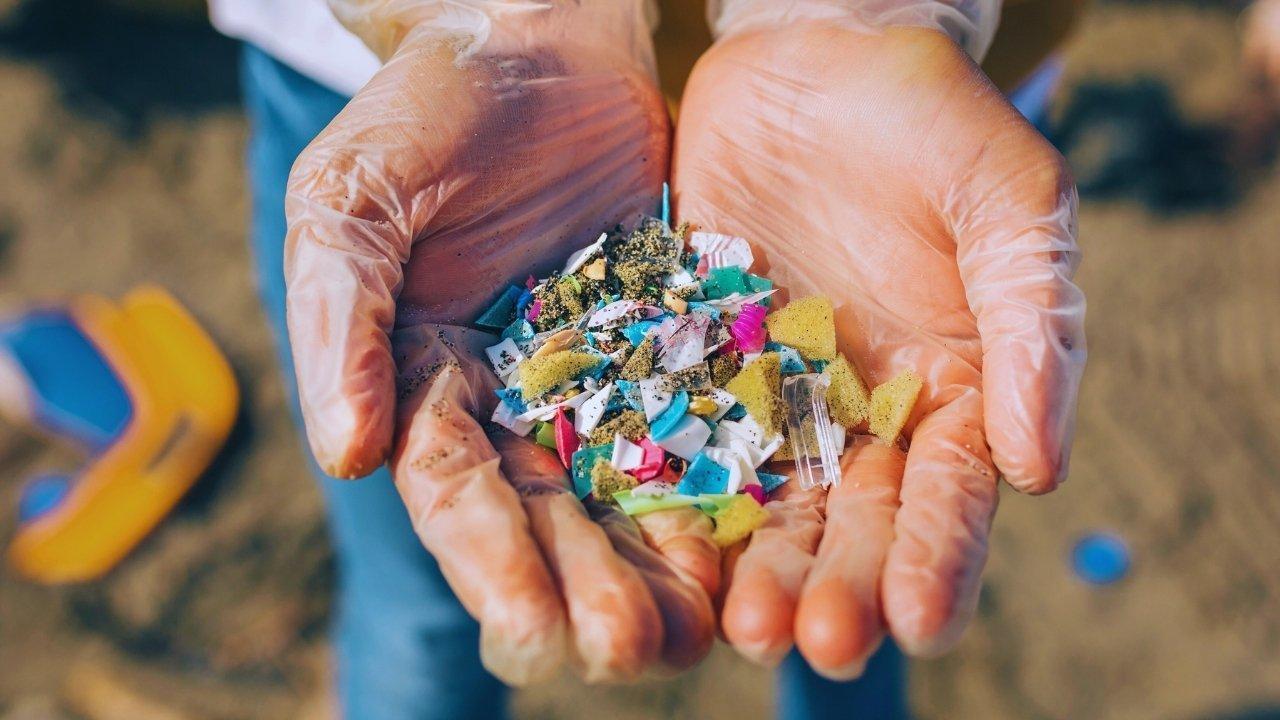
Post by : Anis Karim
Microplastics have become one of the most pressing environmental concerns of the 21st century. While they are often associated with marine pollution and the ingestion of plastic by fish and seabirds, new research highlights an alarming reality: microplastics are also affecting plants. A recent scientific study reveals that tiny plastic particles can disrupt photosynthesis—the very process by which plants convert sunlight into energy. This finding expands our understanding of how deeply plastic pollution has infiltrated ecosystems, raising concerns about food security, biodiversity, and climate stability.
Microplastics are defined as plastic particles smaller than five millimeters. They originate from various sources, including the breakdown of larger plastic items, microbeads found in personal care products, synthetic fibers shed from clothing, and even tire wear from vehicles. Because they are small and durable, microplastics easily spread through air, water, and soil, infiltrating almost every corner of the planet.
While much attention has been given to their impact on marine life, scientists are increasingly focusing on their presence in terrestrial ecosystems. Soil samples around the world—from agricultural fields to forests—show high concentrations of microplastics. Plants, being rooted in soil, are directly exposed, and this exposure is now proving to have serious biological consequences.
Researchers conducted experiments to determine how microplastics influence plant physiology, particularly the photosynthesis process. Using controlled soil conditions, scientists introduced different concentrations and types of microplastic particles and monitored how plants responded over time.
The findings were concerning. Plants exposed to microplastics showed a significant reduction in chlorophyll levels, which are essential for capturing sunlight. Their stomata—the microscopic pores that regulate gas exchange—were also negatively impacted, reducing the intake of carbon dioxide needed for photosynthesis. As a result, the plants’ overall ability to produce energy decreased, leading to stunted growth and reduced biomass.
In simpler terms, microplastics are choking plants from the inside out. By interfering with photosynthesis, they reduce plants’ ability to grow, reproduce, and provide food for other organisms, including humans.
Plants are the foundation of all terrestrial food systems. They provide not only direct nutrition to humans but also feed livestock and support biodiversity through complex food webs. If microplastics impair plant growth and reduce crop yields, the implications for food security are profound.
Imagine a world where staple crops such as rice, wheat, and maize are less productive due to contaminated soils. Farmers may face declining harvests, while consumers could experience rising food prices and nutritional shortages. Already, agricultural soils are heavily exposed to microplastics through the use of sewage sludge as fertilizer, plastic mulching films, and irrigation with polluted water. This means the risk is not a distant possibility but an active and growing concern.
The effects of microplastics on plants extend beyond farming. Forests, grasslands, and wetlands—all of which play crucial roles in maintaining ecological balance—are also vulnerable. If microplastics weaken the health of plants in these ecosystems, the consequences could cascade through the entire environment.
Forests, for example, are vital carbon sinks that absorb carbon dioxide and help regulate the Earth’s climate. If microplastics impair tree photosynthesis, the ability of forests to capture carbon could diminish, accelerating climate change. Wetlands and grasslands, similarly, support unique species and serve as natural buffers against floods and soil erosion. A decline in plant health in these habitats could lead to biodiversity loss and weakened ecosystem resilience.
Understanding how microplastics reach plants is crucial to tackling the problem. Unlike marine environments, where plastic pollution is visible in floating debris, soil microplastics are harder to detect. Yet they are pervasive.
One major source is agricultural practices. Plastic mulching—thin sheets of plastic laid over fields to retain moisture and suppress weeds—eventually breaks down into microplastics. Fertilizers derived from sewage sludge often contain high concentrations of microplastics, which are transferred directly to farmland. Irrigation systems that use polluted water can also carry microplastics into the soil. Even atmospheric deposition—tiny particles carried by wind—can sprinkle plastics onto fields and natural landscapes.
The cumulative effect is that plants are constantly surrounded by microplastics, absorbing them into their roots and experiencing physiological stress as a result.
While the immediate concern is plant health, the issue inevitably loops back to humans. If crops absorb microplastics, they could make their way into the human food chain. Already, studies have detected microplastic particles in fruits, vegetables, grains, and even drinking water. Consuming these particles may pose health risks, from inflammation and oxidative stress to potential long-term impacts that are not yet fully understood.
The reduction in crop productivity due to impaired photosynthesis further threatens human health by limiting food availability and potentially increasing malnutrition rates in vulnerable regions. The intersection of environmental pollution and human well-being has never been clearer.
Addressing the microplastic crisis requires action on multiple fronts:
Reduce Plastic Production: Limiting single-use plastics and transitioning to biodegradable alternatives can curb the introduction of new microplastics into the environment.
Improve Waste Management: Proper recycling, plastic collection, and stricter regulations on plastic disposal are essential to prevent plastics from breaking down into smaller particles.
Sustainable Farming Practices: Encouraging alternatives to plastic mulching, improving wastewater treatment before using sludge as fertilizer, and monitoring irrigation water can minimize microplastic exposure in agriculture.
Scientific Innovation: Researchers are exploring advanced filtration systems to capture microplastics from wastewater and soil treatments that could neutralize or remove plastic particles.
Public Awareness: Educating farmers, policymakers, and consumers about the risks of microplastics to plants and food systems can drive demand for cleaner practices and stricter regulations.
Plastic pollution is a global issue, and so are its impacts on plants. Countries across Asia, Europe, Africa, and the Americas must work together to create comprehensive policies to reduce plastic leakage into the environment. International cooperation will be vital, as plastics produced in one region often travel across borders through trade, rivers, and atmospheric circulation.
This is not just a problem for environmentalists or farmers—it is a challenge that affects everyone. Plants are at the heart of life on Earth. If their ability to grow and photosynthesize is compromised, the ripple effects could threaten food supplies, economies, and the stability of entire ecosystems.
The discovery that microplastics disrupt plant photosynthesis should serve as a wake-up call. For years, scientists and policymakers have focused primarily on the marine impacts of plastic pollution. Now, it is evident that land-based ecosystems are equally at risk. Plants, which provide the oxygen we breathe and the food we eat, are silently suffering under the invisible burden of microplastics.
Solving this crisis requires urgent global action, from reducing plastic production to implementing sustainable agricultural practices. The health of our plants is directly tied to our own survival. Ignoring the problem is no longer an option.
This article is intended for informational purposes only. It does not replace professional environmental or agricultural advice. Readers should consult relevant experts and official guidelines before making decisions related to farming, food production, or environmental management.

Oman Replaces Pakistan in Men’s Junior Hockey World Cup
Oman will replace Pakistan in the 2025 Men’s Junior Hockey World Cup in Tamil Nadu after Pakistan wi

Lakshya Sen Reaches Hylo Open Pre-Quarters After Big Win
Lakshya Sen defeated France’s fifth seed Christo Popov in straight games to reach the Hylo Open pre-

Abhishek Bachchan hits back at Filmfare award allegations
Abhishek Bachchan firmly denied accusations of buying awards or using PR, saying his success comes f

Rain Washes Out India-Australia T20 Series Opener in Canberra
The opening T20 match between India and Australia in Canberra ended early due to heavy rain, leaving

DAMAC Launches Global Search for Ultimate Islander
DAMAC invites adventurers worldwide to apply for a once-in-a-lifetime role as “The Ultimate DAMAC Is

Dortmund Beat Frankfurt in Penalty Shootout to Reach Last 16
Borussia Dortmund defeated Eintracht Frankfurt 4-2 on penalties after a 1-1 draw, advancing to the G

Babyshop Unveils Paris-Inspired Autumn/Winter 2025 Line
Babyshop Arabia launches its AW’25 collection in Paris, uniting cozy comfort, refined design, and ti

Rain Washes Out India-Australia T20 Series Opener in Canberra
The opening T20 match between India and Australia in Canberra ended early due to heavy rain, leaving

Dortmund Beat Frankfurt in Penalty Shootout to Reach Last 16
Borussia Dortmund defeated Eintracht Frankfurt 4-2 on penalties after a 1-1 draw, advancing to the G

Suryakumar, Gill Lead Before Rain Ends Canberra T20 Early
The first T20 between India and Australia in Canberra ended in a washout after strong starts from Su

Juventus Set to Appoint Luciano Spalletti as New Coach
Juventus is expected to announce Luciano Spalletti as its new coach after Igor Tudor’s dismissal, ma

Pogba Set to Return for AS Monaco After Long Suspension
Paul Pogba is close to making his AS Monaco debut after his doping ban was reduced to 18 months, wit

No Makeup Makeup Look Step by Step Guide to Effortless Natural Beauty
Learn the secret to a glowing natural look with our no makeup makeup guide simple steps for effortl

UAE Archers Compete in West Asia Championship in Doha
Seventeen UAE archers, led by Federation President Hanadi Al Kabouri, are competing in the 2nd West

Nicolas Mahut Ends Remarkable Tennis Career at Paris Masters
French tennis legend Nicolas Mahut retires after a 25-year career, remembered for his epic 2010 Wimb